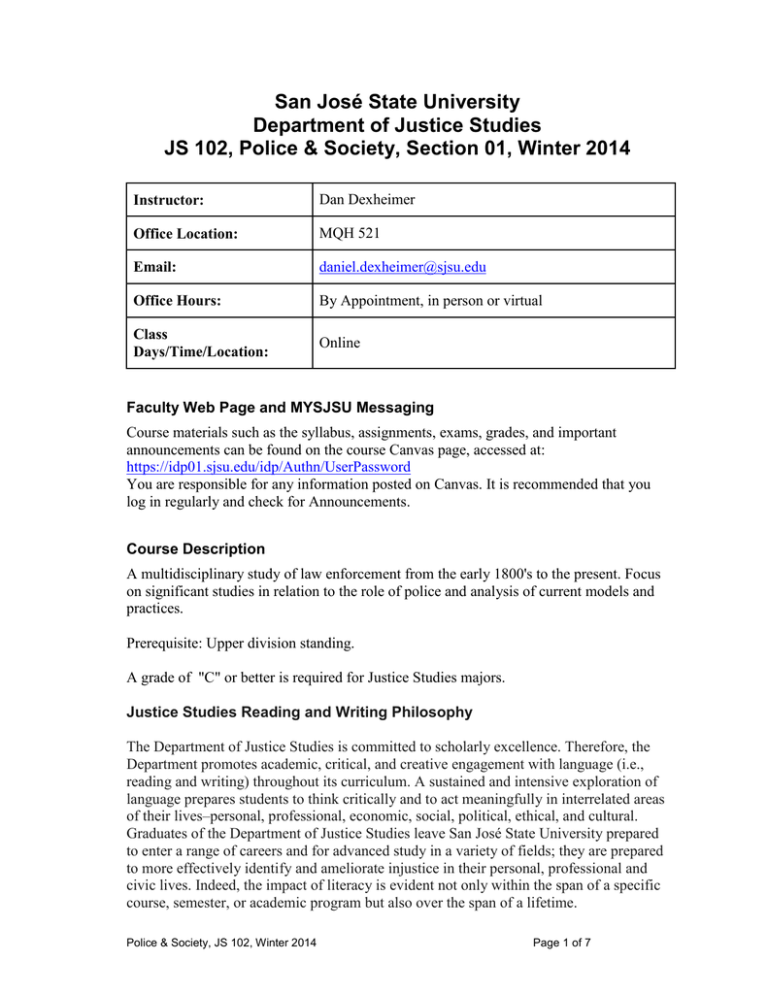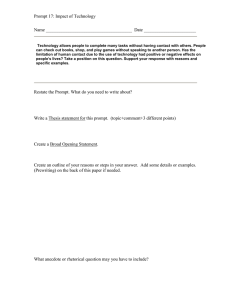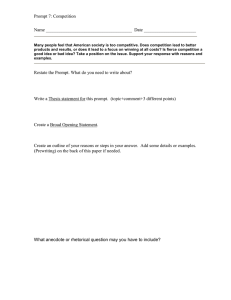San José State University Department of Justice Studies
advertisement

San José State University Department of Justice Studies JS 102, Police & Society, Section 01, Winter 2014 Instructor: Dan Dexheimer Office Location: MQH 521 Email: daniel.dexheimer@sjsu.edu Office Hours: By Appointment, in person or virtual Class Days/Time/Location: Online Faculty Web Page and MYSJSU Messaging Course materials such as the syllabus, assignments, exams, grades, and important announcements can be found on the course Canvas page, accessed at: https://idp01.sjsu.edu/idp/Authn/UserPassword You are responsible for any information posted on Canvas. It is recommended that you log in regularly and check for Announcements. Course Description A multidisciplinary study of law enforcement from the early 1800's to the present. Focus on significant studies in relation to the role of police and analysis of current models and practices. Prerequisite: Upper division standing. A grade of "C" or better is required for Justice Studies majors. Justice Studies Reading and Writing Philosophy The Department of Justice Studies is committed to scholarly excellence. Therefore, the Department promotes academic, critical, and creative engagement with language (i.e., reading and writing) throughout its curriculum. A sustained and intensive exploration of language prepares students to think critically and to act meaningfully in interrelated areas of their lives–personal, professional, economic, social, political, ethical, and cultural. Graduates of the Department of Justice Studies leave San José State University prepared to enter a range of careers and for advanced study in a variety of fields; they are prepared to more effectively identify and ameliorate injustice in their personal, professional and civic lives. Indeed, the impact of literacy is evident not only within the span of a specific course, semester, or academic program but also over the span of a lifetime. Police & Society, JS 102, Winter 2014 Page 1 of 7 Course Goals and Student Learning Objectives Course Content Learning Outcomes LO1 An understanding of the intricate relationship between police and society. LO2 A broad understanding of the important influence constitutional rights have on policing in a democratic society. LO3 The ability to critically assess the historical development of policing in America and its influence on policing in modern society. LO4 Distinguish between ethical, unethical and unprofessional behavior in policing. LO5 An understanding of the importance of ethical behavior and accountability of police in a democracy LO6 Students should read, write, and contribute to discussion at a skilled and capable level. Required Texts/Readings Textbook -Police & Society (5ed), Roberg, Novak, Corder & Smith, Oxford, 2012. ISBN – 978-019-977256-8. Library Liaison Justice Studies Subject Specialist: Nyle Monday Nyle.Monday@sjsu.edu 408-808-2040. Dropping and Adding Students are responsible for understanding the policies and procedures about add/drops, academic renewal, etc. Information on add/drops are available at http://www.sjsu.edu/advising/faq/index.htm#add. Information about late drop is available at http://www.sjsu.edu/aars/policies/latedrops/. Students should be aware of the current deadlines and penalties for adding and dropping classes. Assignments and Grading Policy Critical Thinking Prompts – For each chapter we cover, there will a posted ‘Critical Thinking’ style question for you to respond to. Generally speaking, these are not about being ‘right’ or ‘wrong’, they are about showing me that you are thinking about the question in light of material you are reading. Answering these will require more than a sentence, but should not take longer than a solid paragraph or two. You will have to dedicate time daily to this course. These is not time to fall behind. The prompts are meant to fulfill two goals. One is to have you spend time thinking about the issues. Second is to keep you on track. You will not be able to ‘binge’ and submit all of them at once. If you break our book out over the time of this course, that basically means 1 chapter per day, including weekends. Critical Thinking prompts will only be open for one day on either side of the ‘scheduled’ day, and will not be accepted late. For example, Tuesday, January 7th is the 6th day of our course, thus you should be dealing with chapter 6 on that day. The Police & Society, JS 102, Winter 2014 Page 2 of 7 prompt for chapter 6 will open one day before (Monday the 6th) and will close one day after (Wednesday the 8th). Together, your responses to the prompts comprise 33% of your grade. Exams – There will be a midterm and a final. Each will consist of approximately 40 multiple-choice questions and 2 short-answer/essay questions. These will be open for a 24-hour window (midterm on Friday 1/10, final on Friday 1/17). They will be timed – you will have approximately 75 minutes from the time you begin until the time you finish. With an online class, there is no way to enforce ‘closed book’, but the time limit will mean that you will have to be prepared – you will not have time to look up everything. There will be 2 exams covering material from lecture, readings, and assignments. Each exam is worth 33% of your grade. Rounding – The remaining 1% to reach 100% is a freebie in the rounding. WooHoo! Final grades will be determined by your percentage score as follows: A+: 97% - 100% A : 93% - 96.9% A- : 90% - 92.9% B+: 87% - 89.9% B : 83% - 86.9% B- : 80% - 82.9% C+: 77% - 79.9% C : 73% - 76.9% C- : 70% - 72.9% D+: 67% - 69.9% D : 63% - 66.9% D- : 60% - 62.9% F : ≤ 59.9% Email Policies I encourage you to email me with any questions, but there are a couple rules to follow. Email me directly, not through Canvas. Your subject line must contain the course number and a brief description of what your email pertains to (e.g. JS102 – Ch3 Prompt). Be sure to include your name as well. Also ensure the address the University uses is current and that you check it. General Points about an Online Short-Course If you haven’t taken an online course and/or a short-course before (and even if you have), you must be aware from the very start that the requirements on you are typically very different than a traditional classroom-based, 16-week course. There is no professor to see several times a week to explain things in class, ask questions of easily, or to yell at you when you are not doing your work. You must be dedicated to doing your reading and asking questions you have, and doing your work on time. There is no time to get behind, nor is there time to catch up. Do the math – each day is the equivalent of an entire week of a regular course. So deciding, for example “First day of class is Thursday, but the first day is never all that important, so then it’s Friday, and that’s almost the weekend, so I’ll wait until Monday 1/6 to really get going”, would be the same as waiting until nearly March to show up for your Spring classes. You MUST dedicate time EVERY DAY, starting on (or before) the official first day, including the weekends, to reading and studying and replying to prompts. If you have questions or anything is unclear – don’t wait, email me. Or better yet, post it as a discussion to the CANVAS page, as someone else may share your question. Police & Society, JS 102, Winter 2014 Page 3 of 7 University Policies Academic integrity Students should know the University’s Student Conduct Code, available at http://www.sjsu.edu/studentconduct/docs/Student_Conduct_Code.pdf. Your own commitment to learning, as evidenced by your enrollment at San Jose State University and the University’s integrity policy, require you to be honest in all your academic course work. Faculty members are required to report all infractions to the office of Student Conduct and Ethical Development, found at http://www.sjsu.edu/studentconduct. Instances of academic dishonesty will not be tolerated. Cheating on exams or plagiarism (presenting the work of another as your own, or the use of another person’s ideas without giving proper credit) will result in a failing grade and sanctions by the University. For this class, all assignments are to be completed by the individual student unless otherwise specified. If you would like to include in your assignment any material you have submitted, or plan to submit for another class, please note that SJSU’s Academic Policy F06-1 requires approval of instructors. Campus Policy in Compliance with the American Disabilities Act If you need course adaptations or accommodations because of a disability, or if you need to make special arrangements in case the building must be evacuated, please make an appointment with me as soon as possible, or see me during office hours. Presidential Directive 97-03 requires that students with disabilities requesting accommodations must register with the AEC (Accessible Education Center) to establish a record of their disability. Student Technology Resources Computer labs for student use are available in the Academic Success Center located on the 1st floor of Clark Hall and on the 2nd floor of the Student Union. Additional computer labs may be available in your department/college. Computers are also available in the Martin Luther King Library. A wide variety of audio-visual equipment is available for student checkout from Media Services located in IRC 112. These items include digital and VHS camcorders, VHS and Beta video players, 16 mm, slide, overhead, DVD, CD, and audiotape players, sound systems, wireless microphones, projection screens and monitors. Learning Assistance Resource Center The Learning Assistance Resource Center (LARC) is located in Room 600 in the Student Services Center. It is designed to assist students in the development of their full academic potential and to motivate them to become self-directed learners. The center provides support services, such as skills assessment, individual or group tutorials, subject advising, learning assistance, summer academic preparation and basic skills development. The LARC website is located at http:/www.sjsu.edu/larc. SJSU Writing Center Police & Society, JS 102, Winter 2014 Page 4 of 7 The SJSU Writing Center is located in Room 126 in Clark Hall. It is staffed by professional instructors and upper-division or graduate-level writing specialists from each of the seven SJSU colleges. Our writing specialists have met a rigorous GPA requirement, and they are well trained to assist all students at all levels within all disciplines to become better writers. The Writing Center website is located at http://www.sjsu.edu/writingcenter. Peer Mentor Center The Peer Mentor Center is located on the 1st floor of Clark Hall in the Academic Success Center. The Peer Mentor Center is staffed with Peer Mentors who excel in helping students manage university life, tackling problems that range from academic challenges to interpersonal struggles. On the road to graduation, Peer Mentors are navigators, offering “roadside assistance” to peers who feel a bit lost or simply need help mapping out the locations of campus resources. Peer Mentor services are free and available on a drop –in basis, no reservation required. The Peer Mentor Center website is located at http://www.sjsu.edu/muse/peermentor. CASA Student Success Center The Student Success Center in the College of Applied Sciences and Arts (CASA) provides advising for undergraduate students majoring or wanting to major in programs offered in CASA Departments and Schools. All CASA students and students who would like to be in CASA are invited to stop by the Center for general education advising, help with changing majors, academic policy related questions, meeting with peer advisors, and/or attending various regularly scheduled presentations and workshops. Looking for academic advice or maybe just some tips about how to navigate your way around SJSU? Check out the CASA Student Success Center! It’s also a great place to study, and you can check out laptops. Location: MacQuarrie Hall (MH) 533 - top floor of MacQuarrie Hall. Contact information: 408.924.2910. Website: http://www.sjsu.edu/casa/ssc/. Police & Society, JS 102, Winter 2014 Page 5 of 7 JS 102 – Police & Society, Winter 2014 Course Schedule *All Assignments will OPEN at 12:01 am and CLOSE at 11:59 pm on the associated dates* Date Topics, Readings, Assignments, Deadlines Th 1/2 Read: Chapter 1 – Police in a Democracy Opens: Chapter 1 Critical Thinking Prompt Opens: Chapter 2 Critical Thinking Prompt F 1/3 Read: Chapter 2 – Police History Opens: Chapter 3 Critical Thinking Prompt Closes: Chapter 1 Critical Thinking Prompt Sa 1/4 Read: Chapter 3 – Legal Issues Opens: Chapter 4 Critical Thinking Prompt Closes: Chapter 2 Critical Thinking Prompt Su 1/5 Read: Chapter 4 – Community Issues Opens: Chapter 5 Critical Thinking Prompt Closes: Chapter 3 Critical Thinking Prompt M 1/6 Read: Chapter 5 – Police Management Opens: Chapter 6 Critical Thinking Prompt Closes: Chapter 4 Critical Thinking Prompt Tu 1/7 Read: Chapter 6 – Organizational Change Opens: Chapter 7 Critical Thinking Prompt Closes: Chapter 5 Critical Thinking Prompt W 1/8 Read: Chapter 7 – Selection & Development Opens: Chapter 8 Critical Thinking Prompt Closes: Chapter 6 Critical Thinking Prompt Th 1/9 Read: Chapter 8 – Field Operations Opens: Chapter 9 Critical Thinking Prompt Closes: Chapter 7 Critical Thinking Prompt F 1/10 Opens: Exam 1 (Chapters 1-8) Closes: Exam 1 (Chapters 1-8) Read: Chapter 9 – Behavioral Misconduct Opens: Chapter 10 Critical Thinking Prompt Closes: Chapter 8 Critical Thinking Prompt Sa 1/11 Read: Chapter 10 – Force & Coercion Opens: Chapter 11 Critical Thinking Prompt Closes: Chapter 9 Critical Thinking Prompt Police & Society, JS 102, Winter 2014 Page 6 of 7 Su 1/12 Read: Chapter 11 – Accountability & Ethics Opens: Chapter 12 Critical Thinking Prompt Closes: Chapter 10 Critical Thinking Prompt M 1/13 Read: Chapter 12 – Diversity Opens: Chapter 13 Critical Thinking Prompt Closes: Chapter 11 Critical Thinking Prompt Tu 1/14 Read: Chapter 13 – Stress & Officer Safety Opens: Chapter 14 Critical Thinking Prompt Closes: Chapter 12 Critical Thinking Prompt W 1/15 Read: Chapter 14 – Higher Education Opens: Chapter 15 Critical Thinking Prompt Closes: Chapter 13 Critical Thinking Prompt Th 1/16 Read: Chapter 15 – Emerging Issues Closes: Chapter 14 Critical Thinking Prompt F 1/17 Opens: Exam 2 (Chapters 9-15) Closes: Chapter 15 Critical Thinking Prompt Closes: Exam 2 (Chapters 9-15) **All information is subject to change based on the progression of the course and the Instructor’s discretion.** Police & Society, JS 102, Winter 2014 Page 7 of 7

